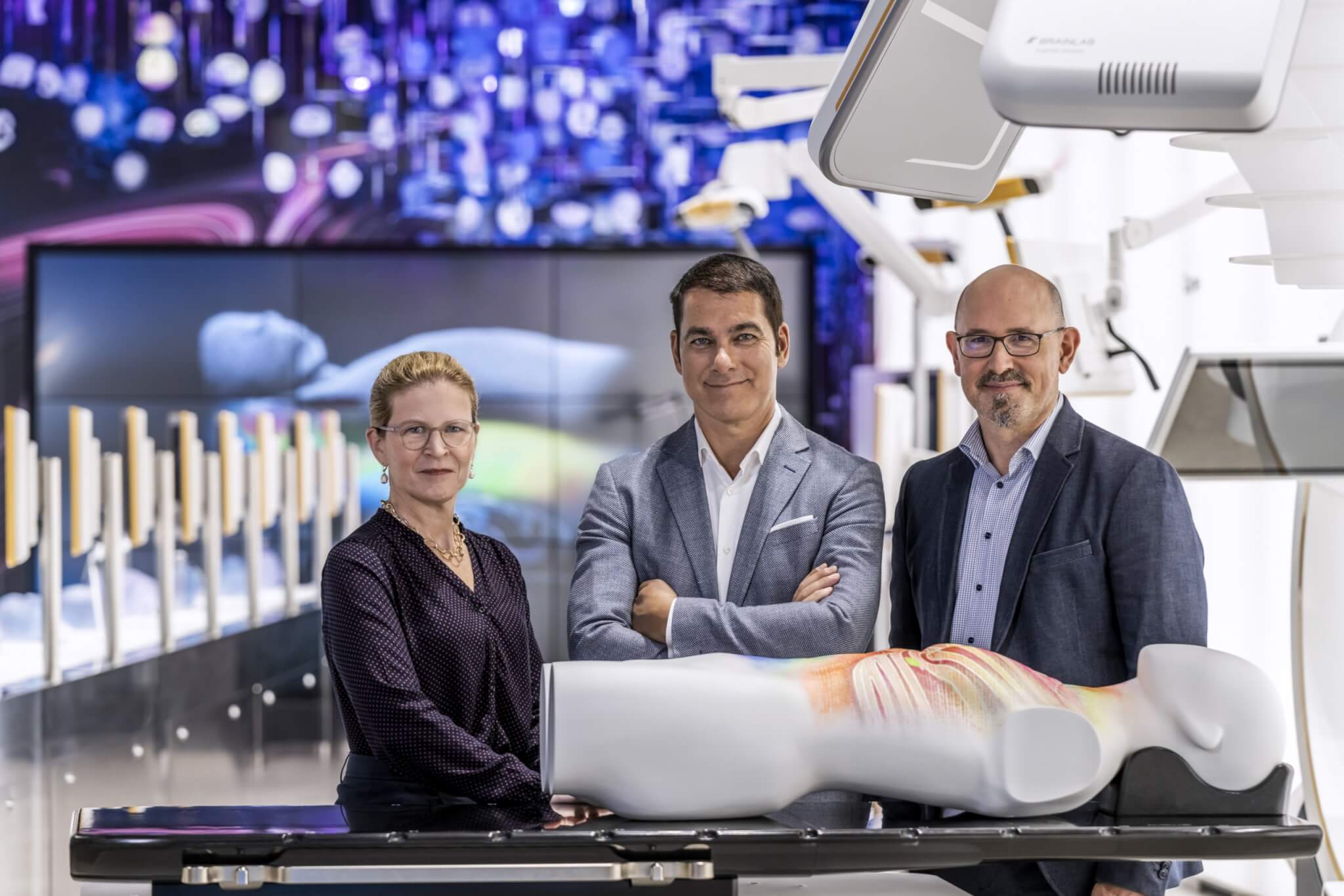Stefan Vilsmeier, Claus Promberger and Professor Cordula Petersen, MD Receive Nomination for the Federal President’s Award for Innovation and Technology in Germany

Brainlab founder, Brainlab Vice President R&D and the Clinic Director of the Clinic for Radiotherapy and Radiation Oncology at the University Medical Center Hamburg-Eppendorf (UKE) nominated for their work in high precision radiation therapy for cancer
Stefan Vilsmeier and Claus Promberger from Brainlab, a leader in the field of digital medical technology, and Professor Cordula Petersen, MD from the UKE in Hamburg were nominated today for the Federal President’s Award for Innovation and Technology 2022 for ExacTrac Dynamic® technology. The prize has been awarded annually by the German Federal President for over 25 years and honors outstanding technical, engineering, scientific as well as software and algorithm-based achievements within Germany. The jury for the award consists of ten independent industry experts from the fields of science and medicine.
ExacTrac Dynamic technology tracks patients with various types of tumors during radiation therapy. With this technology, real-time data is used to verify the position of the tumor and deliver radiation with submillimetric precision. During treatment, the radiation beam can be controlled based on the position of the tumor making it possible to effectively destroy tumor tissue while sparing healthy tissue. The system enables significantly faster treatment delivery with fewer subsequent side effects compared to standard radiotherapy treatments. For the development of this groundbreaking technology, Stefan Vilsmeier and Claus Promberger worked closely with Professor Cordula Petersen, MD. As one of the first physicians to use ExacTrac technology in the radiation oncology clinic at the UKE, Professor Cordula Petersen, MD regularly shared clinical observations and insights from her years of experience in the field of stereotactic radiosurgery and radiotherapy.
“Being nominated for this award offers outstanding recognition of our interdisciplinary team’s work, research and clinical expertise,” said Stefan Vilsmeier, CEO and President of Brainlab. “It further validates our vision of using software-based medical technology to advance cancer therapy and make it accessible to more people worldwide. Radiation therapy is well positioned to play a pivotal role in the future of cancer therapy and even has the potential to become the treatment of choice.”
Professor Cordula Petersen, MD added, “The potential of ExacTrac Dynamic technology is tremendous. In the future, a considerable number of cancer patients could be treated faster and experience fewer side effects compared to standard radiotherapy treatments, which can potentially damage the lungs. This method can support a better quality of life. Moreover, the chances of disease remission could increase significantly as even small, early-stage tumors could be treated with this method in the future.”
Combining Research and Clinical Expertise
Cancer is one of the most common causes of death. According to the International Agency for Research on Cancer, in 2020, there were an estimated 9.96 million cancer-related deaths worldwide.
The ongoing development of ExacTrac Dynamic is supported and advanced by the close collaboration between Stefan Vilsmeier, Claus Promberger and Professor Cordula Petersen, MD. This is leading to the successful realization of their unified vision. For decades, Stefan Vilsmeier and Claus Promberger have been instrumental in shaping the development of non-invasive patient positioning for radiotherapy at Brainlab. In the meantime, Professor Petersen provided feedback on the practical implementation of the technology and treatment concepts for stereotactic radiosurgery and radiotherapy. Through her work with the German Society of Radiation Oncology (DEGRO), Professor Petersen is also gathering valuable insights for the further development of ExacTrac Dynamic technology.
The nomination for the Federal President’s Award for Innovation and Technology is the result of a multi-stage selection process led by a jury comprised of independent industry experts from the fields of science and medicine. To be nominated, each technology must meet specific criteria and, above all, display a high level of scientific and technical innovation, clear patentability and current implementation or strong potential for implementation in the future.
The Federal President, Frank-Walter Steinmeier, will present the award to the winners on October 26th, 2022, during an award ceremony in Berlin.
Press Photos
More press photos are available in our Media Library.
Brainlab
Brainlab creates software-driven med tech digitizing, automating and optimizing clinical workflows. Serving physicians, medical professionals and patients in 6700 hospitals in 127 countries, we’re transforming healthcare to improve the lives of patients everywhere. We employ over 2400 people in 25 locations worldwide. Visit and follow: Brainlab, LinkedIn, Facebook and Instagram.
The Medical Center Hamburg-Eppendorf (UKE)
Since its foundation in 1889, the Medical Center Hamburg-Eppendorf (UKE) has been one of the leading clinics in Europe. With about 14,400 employees, the UKE is one of the largest employers in the Free and Hanseatic City of Hamburg. The UKE treats about 497,000 patients a year, 90,000 of them as inpatients and 407,000 as outpatients. The main areas of research at the UKE include the neurosciences, cardiovascular research, health care research, oncology, as well as infections and inflammations. The UKE trains about 3,400 medical specialists, dentists and midwives.
Knowledge, Research, Healing through Shared Competence: The UKE | www.uke.de
About the DEGRO
The German Society of Radiation Oncology (DEGRO) was founded in 1995 as a scientific society of physicians, medical physicists and radiation biologists working in the field of radiation oncology in Germany. Since then, the society has worked to make advancements in the fields of radiation physics, radiation biology and clinical research to establish a solid scientific basis for radio-oncology. The rules of good scientific practice, ethical standards and legal regulations form the foundation of DEGRO. For more information, visit www.degro.org.